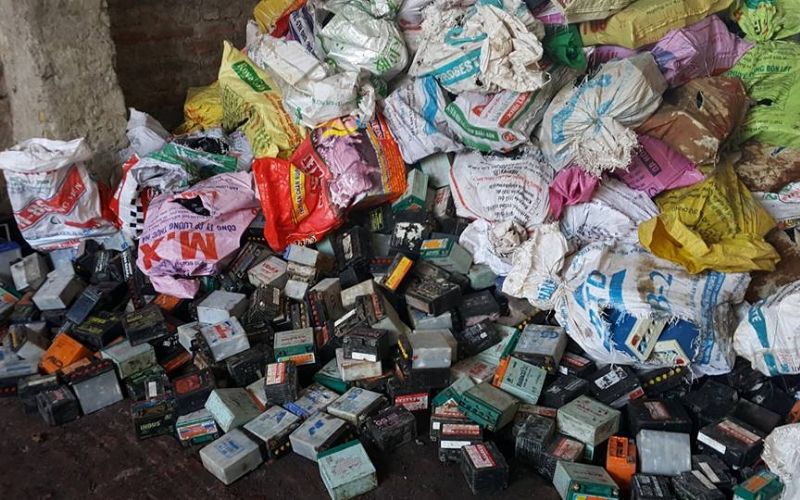Used batteries can be found in almost every household, powering devices such as clocks, TV remotes, air conditioning remotes, and computer mice. However, many people have the bad habit of carelessly discarding these batteries, unaware of the potential dangers they pose.
So, what are the consequences of improper battery disposal? Let’s explore the information below to find out.
1. Why shouldn’t batteries be thrown into the trash?
Used batteries are considered hazardous waste and are challenging to decompose. Despite this, people often dispose of them irresponsibly, either by burying or burning them along with other garbage.
This careless behavior has severe environmental implications and poses a significant threat to our health. According to research conducted by the Institute of Environmental Science and Development, when used batteries are buried, heavy metals such as lead, zinc, cadmium, and mercury seep into the soil and contaminate groundwater.
Burning batteries release these same hazardous components into the air, creating toxic smoke and polluting the atmosphere. Moreover, each heavy metal within a battery, if not properly handled, can lead to more serious issues than we might imagine.
 The dangers of improper battery disposal
The dangers of improper battery disposal
Mercury Poisoning
Mercury is an extremely toxic heavy metal. Inhaling mercury vapor can cause it to enter the body and damage the brain, kidneys, cardiovascular system, and reproductive organs. The amount of mercury in a single battery is capable of contaminating 500 liters of water or one square meter of soil.
Zinc Poisoning
Zinc poisoning can cause symptoms such as vomiting, tremors, reduced natural reflexes, and paralysis.
Lead Poisoning
Lead interferes with calcium absorption in bones, affecting brain electrical impulse transmission. It also disrupts biochemical reactions in the body, leading to rickets, growth retardation in children, and high blood pressure in the elderly. Lead poisoning damages the blood and bones, affects brain function, causing memory loss, reduced cognitive abilities, and even infertility.
Cadmium Poisoning
Cadmium is a contributor to various dangerous diseases, including osteoporosis, liver and kidney failure, anemia, lung cancer, and prostate cancer. It is especially harmful to pregnant women, increasing the risk of birth defects.
2. How to properly dispose of used batteries
Whether thrown away, buried, or burned, used batteries can have devastating consequences for the environment and our health. To protect ourselves and those around us, it is crucial to follow the proper disposal method outlined below.
After a battery has been used, place it in a clean glass or plastic jar, ensuring it is out of the reach of children. Instead of disposing of it with regular garbage, hand it over to waste collectors once a year and inform them that it is a used battery so they can handle it according to regulations.
For larger batteries or battery packs, such as those found in vehicles, place them in a cardboard box and give them to waste collectors for proper disposal.
 Proper battery disposal methods
Proper battery disposal methods
These seemingly small and harmless batteries possess a tremendous destructive potential. While you may not see the immediate impact, the toxic substances within them can gradually build up in our bodies, leading to severe health issues in the years to come.
For more information, explore our article on the year 2023 and its significance. Let’s take action now for the environment, for ourselves, and for future generations. Don’t throw away batteries carelessly; dispose of them properly.





































